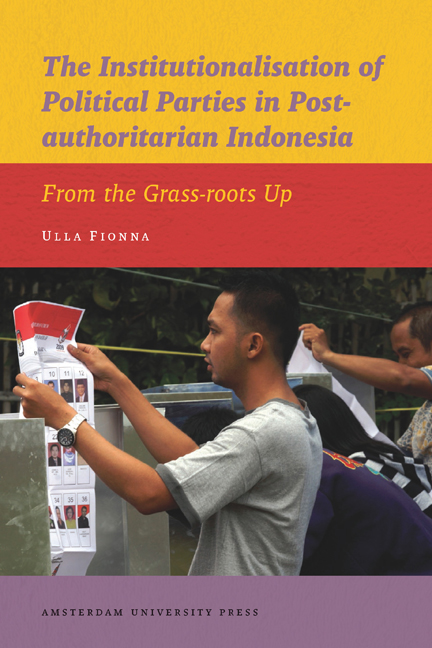 The Institutionalisation of Political Parties in Post-authoritarian Indonesia
The Institutionalisation of Political Parties in Post-authoritarian Indonesia Book contents
- Frontmatter
- Dedication
- Contents
- Preface
- Acknowledgements
- 1 The Question of Institutionalisation
- 2 Genesis of Modern Political Organisation in Indonesia
- 3 Diminishing Grass-roots Influence during the New Order
- 4 Party Organisation
- 5 Party Activities
- 6 Recruitment Approaches
- 7 Members’ Motivations and Participation in the Parties
- 8 Party Career and Intra-party Democracy
- 9 Progress of Party Institutionalisation and Its Role in Indonesia’s Democratisation
- Glossary
- Notes
- Bibliography
- Index
- Miscellaneous Endmatter
9 - Progress of Party Institutionalisation and Its Role in Indonesia’s Democratisation
Published online by Cambridge University Press: 28 January 2021
- Frontmatter
- Dedication
- Contents
- Preface
- Acknowledgements
- 1 The Question of Institutionalisation
- 2 Genesis of Modern Political Organisation in Indonesia
- 3 Diminishing Grass-roots Influence during the New Order
- 4 Party Organisation
- 5 Party Activities
- 6 Recruitment Approaches
- 7 Members’ Motivations and Participation in the Parties
- 8 Party Career and Intra-party Democracy
- 9 Progress of Party Institutionalisation and Its Role in Indonesia’s Democratisation
- Glossary
- Notes
- Bibliography
- Index
- Miscellaneous Endmatter
Summary
My examination of Partai Golkar, PDIP, PKS and PAN has found that the organisational superiority of one party over another depends on the commitment and skills of local party personnel, as well as local resources. More institutionalised party branches have greater capacity to conduct activities and programmes and provide channels for political participation, while less institutionalised branches, similar to the dysfunctional New Order parties, tend to be passive and ineffective.
Little Steps Forward
Applying Western theories to Indonesia can be problematic, particularly because Western democracies are much more advanced and their parties are more institutionalised than those in Indonesia, where parties have never fully developed. However, Western theories can still serve as a benchmark for assessing party progress and the stage of party development in Indonesia. Moreover, these theories remain the sole standards of measurement available for this kind of analysis in any setting, including the transitional democracies of Eastern Europe and other developing countries in Latin America, Asia and Africa.
Using these measures, Indonesian parties on the whole have made significant progress in their organisational management at the grassroots level. Their ability to build ‘stable roots in society’ and establish local presences (Mainwaring & Scully 1995: 5, 16) is demonstrated by the mere existence of their branch organisations and the frequent activities the majority of them hold. Compared with the Old and New Order parties, the current parties have more genuine local presences. Their local branches remain active beyond elections, in stark contrast to the parties of the New Order period. Consequently, the branches of the current parties, as those parties’ local representatives, are able to project and promote party platforms and programmes at the local level, which in turn familiarise the public with them. That the parties can maintain local branches has also demonstrated their ability to manage their organisations, as well as to recruit members and facilitate their participation in party activities.
This study has also shown the importance of the ‘nuts and bolts’ of everyday structures and processes for local party organisation. Facilities and resources such as party offices, communication tools and finances are crucial for the efficiency of a branch. The commitment of party personnel, who expend their time and effort for the branches, is also enormously important for party organisation.
- Type
- Chapter
- Information
- The Institutionalisation of Political Parties in Post-authoritarian IndonesiaFrom the Grass-roots Up, pp. 187 - 210Publisher: Amsterdam University PressPrint publication year: 2013


